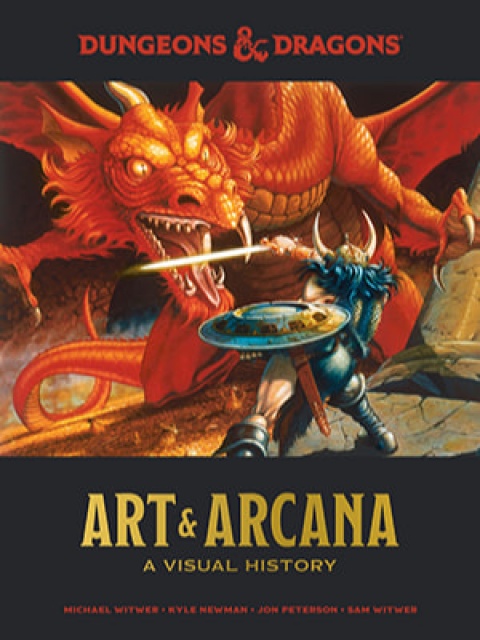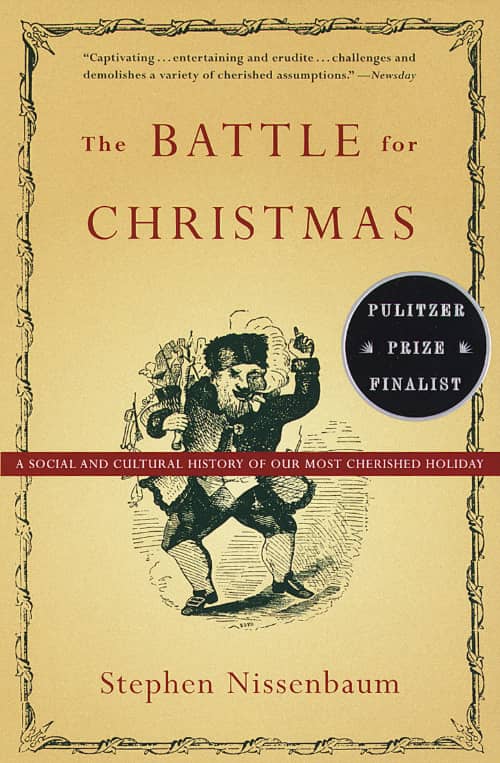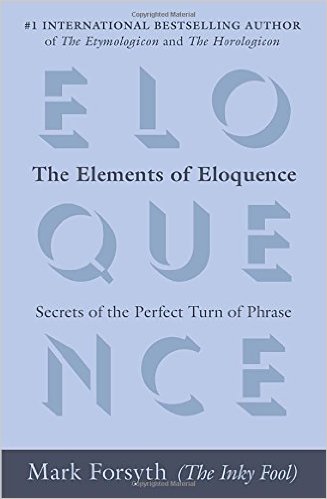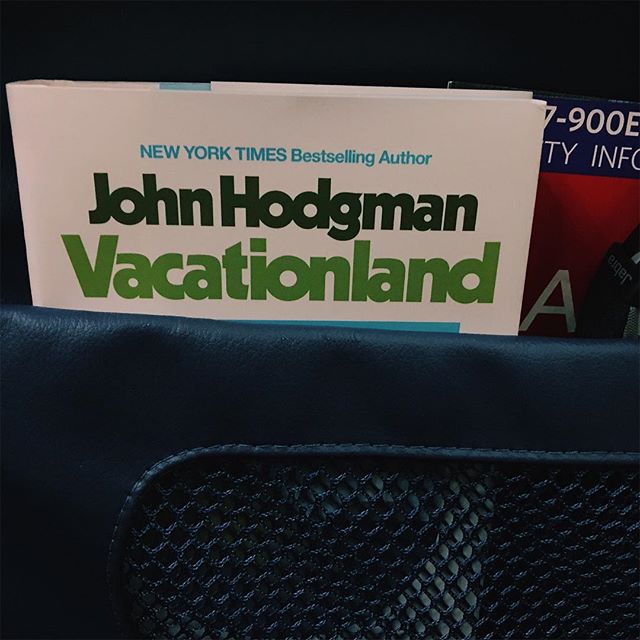I really like this extension that tells you if a book you’re viewing at Amazon is available at your local library. I wish it could tell me how much money I’ve saved over time. And I wish it could speed up my holds while I’m dreaming.
books

Speaking of digital habits, Cal Newport has a new book called Digital Minimalism. This GQ interview has some great gems on the rise of social media, like this: "It took this careful attention engineering, and cultural engineering, to try to make this seem innovative, and high-tech, and like you had to be doing this. If that falls apart, the whole thing goes." Ezra Klein also recently had him on his podcast: Cal Newport has an answer for digital burnout.

I got this fun nostalgia bomb of a book as a Christmas present. It includes the visual history of iconic D&D monsters, campaign settings, and pop culture crossovers. I'm probably the target market. I grew up in the 80s playing this game and I play the latest version today. Seeing the evolution of the game over time is fascinating.
For an online equivalent, follow Old School FRP which posts art and ephemera from 80s role playing games.
For an online equivalent, follow Old School FRP which posts art and ephemera from 80s role playing games.

The Battle for Christmas by Stephen Nissenbaum
If you like to take the mystery out of things by putting them into a historical context have I got a book for you. The Battle for Christmas is not about the phrase "war on Christmas" and all of the BS that conjures. This book is about how Christmas evolved from a rowdy public festival into the more family-focused holiday people practice today. Nissenbaum also explores the origins of Christmas trees, Santa, and gift-giving. He supports his arguments with detailed historic documents and reading it feels like visting a familiar but alternate universe. I like to revisit this book every year around this time as my family cuts down a tree, hauls it inside, and puts shiny things on it.
For a lighter take on the history behind Christmas traditions check out Mark Forsyth's A Christmas Cornucopia. I'm a big fan of Forsyth's books about language (especially The Elements of Eloquence) and he brings his same humor and love of language to this topic.
For a lighter take on the history behind Christmas traditions check out Mark Forsyth's A Christmas Cornucopia. I'm a big fan of Forsyth's books about language (especially The Elements of Eloquence) and he brings his same humor and love of language to this topic.

Alan Taylor at In Focus (no relation) focuses on photographs taken in and around libraries.
Link Carousel
Thanks for joining me as I clear out my saved links. It is time for week-old links to enter the carousel...
Recommend Me A Book is a fun site. It shows the text from the first page of a book and you can reveal the title and author after you read. I had fun trying to guess the book as I read.
I also had fun this week playing with random text engine Perchance. You give it some base text, a few simple rules, and you get a random text generator. I made one that predicts what's coming next in technology: next gen. (e.g. "hyperlocal ocelot conferencing" is the sort of thing this would generate.) Looking at the generators community page I see there are lot of people using it for D&D so I predict that I will be back in the future to make more.
I'm still on my mechanical keyboard bs. Massdrop is a site that organizes group buys of keyboards and keycaps. They have a good overview of why some people get into them: Mechanical Keyboards 101. I don't buy keyboards anymore though, I just read Massdrop for the articles.
The worst aspects of web culture were on display this week in Kathy Griffen's Standing up to Trump and Erin Biba's What It’s Like When Elon Musk’s Twitter Mob Comes After You. These are a good lesson in punching up/down and a reminder that this behavior isn't inevitable. The people who own and control the spaces where we interact online (hi, Twitter!) can stop this.
Zeldman on modern web development: The Cult of the Complex. I was nodding along with this, especially: "The question for web designers should never be how complex can we make it. But that’s what it has become." I don't think people consciously try to make development processes complex, but they end up that way through decisions by folks who aren't thinking about projects past their next deadline. Sean Kelly posted a thread on Twitter about what he looks for in a software engineer that seems related to me.
One of the reasons I went with a Logan's Run reference up top is because I just finished watching the Netflix documentary Wild Wild Country. I'm pretty sure the Logan's Run designers were inspired by 70s commune fashion. This documentary uses a lot of TV video footage from the time paired with beautiful modern cinematography. It gave me a lot to think about—I'm going to be processing this one for a while.
Also processing: this Twitter thread by Erynn Brook on mansplaining and different conversational styles. (Continuing wish: less Twitter as a platform for these kinds of conversations and more personal blogs.)
We don't deserve it, but there's a new Neko Case album!
Renew, renew!
Recommend Me A Book is a fun site. It shows the text from the first page of a book and you can reveal the title and author after you read. I had fun trying to guess the book as I read.
I also had fun this week playing with random text engine Perchance. You give it some base text, a few simple rules, and you get a random text generator. I made one that predicts what's coming next in technology: next gen. (e.g. "hyperlocal ocelot conferencing" is the sort of thing this would generate.) Looking at the generators community page I see there are lot of people using it for D&D so I predict that I will be back in the future to make more.
I'm still on my mechanical keyboard bs. Massdrop is a site that organizes group buys of keyboards and keycaps. They have a good overview of why some people get into them: Mechanical Keyboards 101. I don't buy keyboards anymore though, I just read Massdrop for the articles.
The worst aspects of web culture were on display this week in Kathy Griffen's Standing up to Trump and Erin Biba's What It’s Like When Elon Musk’s Twitter Mob Comes After You. These are a good lesson in punching up/down and a reminder that this behavior isn't inevitable. The people who own and control the spaces where we interact online (hi, Twitter!) can stop this.
Zeldman on modern web development: The Cult of the Complex. I was nodding along with this, especially: "The question for web designers should never be how complex can we make it. But that’s what it has become." I don't think people consciously try to make development processes complex, but they end up that way through decisions by folks who aren't thinking about projects past their next deadline. Sean Kelly posted a thread on Twitter about what he looks for in a software engineer that seems related to me.
One of the reasons I went with a Logan's Run reference up top is because I just finished watching the Netflix documentary Wild Wild Country. I'm pretty sure the Logan's Run designers were inspired by 70s commune fashion. This documentary uses a lot of TV video footage from the time paired with beautiful modern cinematography. It gave me a lot to think about—I'm going to be processing this one for a while.
Also processing: this Twitter thread by Erynn Brook on mansplaining and different conversational styles. (Continuing wish: less Twitter as a platform for these kinds of conversations and more personal blogs.)
We don't deserve it, but there's a new Neko Case album!
Renew, renew!
The Cycle of Link
The big links tend to eat the smaller links, but new links are born every day to replace them. Here now are a few links gathered from their natural habitat and presented for exhibition.
Remember TV? They still make shows for it and some of them are enjoyable. If you're a fan of Ernest Shackleton or the Age of Discovery you should check out The Terror. It's not Shackleton's story unfortunately, but it is speculative fiction about Franklin's lost expedtion with some supernatural horror elements thrown in for—I don't know—fun? It's very well done and you could follow it up with a recent NOVA episode called Arctic Ghost Ship to ground the story in reality again.
I've also been enjoying Legion which is the least Marvel-y of all the Marvel shows and has some stellar acting. You really need start with the first season on this one to get up to speed and it helped me to watch along with the fine folks of MeFi.
Check out these early data visualizations from 1953 by Herbert Bayer: The World Geo-Graphical Atlas. I found this via a great profile of Field Notes: Why Field Notes Have Remained Curiously Addictive for a Decade. That also lead me to their collection of promotional memo books. There are still lessons to learn from this almost forgotten, functional design.
I use Stack Overflow just about every day and they recently launched a neat new way for teams to use their knowledge-gathering tools privately: Stack Overflow for Teams. And by 'they' I specifically mean my friend Geoff at SO who worked on this project, congrats on the launch!
The Tarot Cards of Tech will help you think about the future of something you're making. These cards have questions that don't come up when you're focused on the next to-do item and they seem like a fun way to step back and think about the big picture.
I haven't used The Greatest Keyboard of All Time (IBM Model M) and I'm skeptical of that title since we all agree that Realforce Topre keyboards are the GOAT.
I've been thinking about shift vs. support conversation since I read The Mistake I Made With My Grieving Friend.
If you haven't seen Childish Gambino's This is America you must have been offline for the past seven days. Welcome back and you have to see this!
Let us now fade into the background having examined links outside of their natural environment. Perhaps we will better understand them next time we ecounter: The Cycle of Link. [music swells, credits]
Remember TV? They still make shows for it and some of them are enjoyable. If you're a fan of Ernest Shackleton or the Age of Discovery you should check out The Terror. It's not Shackleton's story unfortunately, but it is speculative fiction about Franklin's lost expedtion with some supernatural horror elements thrown in for—I don't know—fun? It's very well done and you could follow it up with a recent NOVA episode called Arctic Ghost Ship to ground the story in reality again.
I've also been enjoying Legion which is the least Marvel-y of all the Marvel shows and has some stellar acting. You really need start with the first season on this one to get up to speed and it helped me to watch along with the fine folks of MeFi.
Check out these early data visualizations from 1953 by Herbert Bayer: The World Geo-Graphical Atlas. I found this via a great profile of Field Notes: Why Field Notes Have Remained Curiously Addictive for a Decade. That also lead me to their collection of promotional memo books. There are still lessons to learn from this almost forgotten, functional design.
I use Stack Overflow just about every day and they recently launched a neat new way for teams to use their knowledge-gathering tools privately: Stack Overflow for Teams. And by 'they' I specifically mean my friend Geoff at SO who worked on this project, congrats on the launch!
The Tarot Cards of Tech will help you think about the future of something you're making. These cards have questions that don't come up when you're focused on the next to-do item and they seem like a fun way to step back and think about the big picture.
I haven't used The Greatest Keyboard of All Time (IBM Model M) and I'm skeptical of that title since we all agree that Realforce Topre keyboards are the GOAT.
I've been thinking about shift vs. support conversation since I read The Mistake I Made With My Grieving Friend.
If you haven't seen Childish Gambino's This is America you must have been offline for the past seven days. Welcome back and you have to see this!
Let us now fade into the background having examined links outside of their natural environment. Perhaps we will better understand them next time we ecounter: The Cycle of Link. [music swells, credits]
flight plans
The Elements of Eloquence
I want to share a book I read recently that I absolutely loved: The Elements of Eloquence by Mark Forsyth.

My introduction to this book was this tweet:
Forsyth devotes one chapter to each figure of rhetoric identified by the Ancient Greeks. He describes them as, "...techniques for making a single phrase striking and memorable just by altering the wording." Some figures are familiar friends like alliteration. Some figures like hendiadys evade ease and detection. Some figures work across sentences like these three that start with the same words: anaphora. Of course you don't need to know the figures of rhetoric to use or appreciate them, but knowing how they work can help you employ them strategically.
The most fun aspect for me was the way Forsyth uses each figure to describe that figure throughout each chapter. Identifying each use became something of a puzzle to solve while learning about how puzzles work. Forsyth also frequently gives a prime example of each figure that everyone knows. Then he draws on everything from Shakespeare to poetry to music lyrics to illustrate each one. He demonstrates that rhetorical figures aren't a dusty relic, they're a part of the natural way we use language that we can tune into and appreciate.
It was a joy to read and joy is in need. And like all correct-thinking people, Mark Forsyth has a blog. It's The Inky Fool.

My introduction to this book was this tweet:
I felt like I was getting a glimpse at the source code that runs English. Not at the syntax and grammar level (though there is a bit of that), but the presentation layer. I got the preview from Amazon and stumbled on this passage:Things native English speakers know, but don't know we know: pic.twitter.com/Ex0Ui9oBSL
— Matthew Anderson (@MattAndersonBBC) September 3, 2016
A poet is not somebody who has great thoughts. That is the menial duty of the philosopher. A poet is somebody who expresses his thoughts, however commonplace they may be, exquisitely. That is the one and only difference between the poet and everybody else.That passage felt like demystifying a mystical process and from there I was hooked. I ordered the book and read it cover to cover.
Forsyth devotes one chapter to each figure of rhetoric identified by the Ancient Greeks. He describes them as, "...techniques for making a single phrase striking and memorable just by altering the wording." Some figures are familiar friends like alliteration. Some figures like hendiadys evade ease and detection. Some figures work across sentences like these three that start with the same words: anaphora. Of course you don't need to know the figures of rhetoric to use or appreciate them, but knowing how they work can help you employ them strategically.
The most fun aspect for me was the way Forsyth uses each figure to describe that figure throughout each chapter. Identifying each use became something of a puzzle to solve while learning about how puzzles work. Forsyth also frequently gives a prime example of each figure that everyone knows. Then he draws on everything from Shakespeare to poetry to music lyrics to illustrate each one. He demonstrates that rhetorical figures aren't a dusty relic, they're a part of the natural way we use language that we can tune into and appreciate.
It was a joy to read and joy is in need. And like all correct-thinking people, Mark Forsyth has a blog. It's The Inky Fool.
Prime Reading
If you're an Amazon Prime person you might want to head over to their new Prime Reading to see what's available. They've made a bunch of Kindle books, magazines, and graphic novels free for Primesters. If you need a place to start you can't go wrong with classic Moebius or early Peanuts.
sci-fi & fantasy
-
by Hiroshi Yoshida.
-
Looking at Instagram and social media though Berger's Ways of Seeing.

